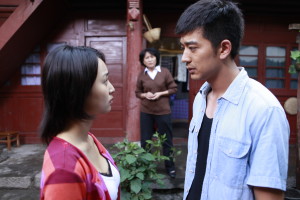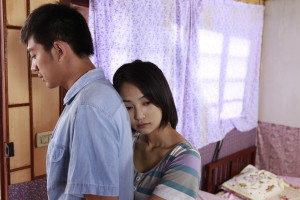Crossing the Border
非常之恋
China, 2012, colour, 16:9, 91 mins.
Director: Zhang Zeming 张泽鸣.
Rating: 7/10.
Modest but well-observed love story set in Yunnan, with a revelation in newcomer Liu Zhihan.
Yunnan province, southern China, the present day. On a coach to Yunshui township, Gui (Li Mincheng) bumps into local girl Ning Xiaoju (Liu Zhihan) when some layabouts, led by local rich kid Wuyi (Wei Daxun), force him to give up his seat for her – an offer she doesn’t accept, as she can’t stand Wuyi. Gui has come a long distance to meet the shady Long (Zhao Wensheng), but Long is away on business and asks him to wait a few days. By chance, Gui takes a room in a private house owned by Yufen (Zhang Huiling), Ning Xiaoju’s mother, who has been raising Ning Xiaoju and her younger brother Ning Xiaobing (Ding Jiali) on her own since her husband ran off with another woman. While waiting for an acceptance letter from Zhongshan University, Guangzhou, to study journalism, Ning Xiaoju sells vegetables with her grandmother (Chen Abao) in the town’s market to help pay the bills. Ning Xiaoju suspects the letter has arrived but her mother has destroyed it, as the family has no money to fund her studies. Long finally arrives in town and Gui gives him some money he’s been carrying; Long says he cannot arrange anything at the moment, as things are “sensitive”. Gui finally manages to win Ning Xiaoju’s friendship after  giving her the acceptance letter that he discovered by chance in his room. He even manages to bond with Wuyi after making it clear he won’t fight him for Ning Xiaoju’s affections. He also asks Wuyi for a loan of RMB10,000, saying his mother is sick. But as the time approaches for Gui to leave the township, Ning Xiaoju becomes more and more fond of him, as well as taking a career decision that affects her future.
giving her the acceptance letter that he discovered by chance in his room. He even manages to bond with Wuyi after making it clear he won’t fight him for Ning Xiaoju’s affections. He also asks Wuyi for a loan of RMB10,000, saying his mother is sick. But as the time approaches for Gui to leave the township, Ning Xiaoju becomes more and more fond of him, as well as taking a career decision that affects her future.
REVIEW
Made for China Movie Channel but with theatrical showings in mind, Crossing the Border 非常之恋 is the first feature by Guangzhou-raised, Hong Kong-based writer-director Zhang Zeming 张泽鸣 since Foreign Moon 月满英伦 (1996). Best known for his debut Swan Song 绝响 (1985), one of the first Fifth Generation movies to critique China’s value shifts during the 1980s, Zhang briefly re-emerged a few years ago with the Lanzhou-to-Everest oldies biking documentary, Across the Plateau 穿越高原 (2007), co-directed with d.p. Liu Baohua 刘保华 [Paul Liu], but then disappeared off the radar again. Inspired by a true story that happened in Hubei province, but here transferred to the southern province of Yunnan, Crossing marks a significant return by Zhang to feature-length fiction – a well-played relationships triangle that has something of his delicate female-love story Sun and Rain 太阳雨 (1988) in its surface simplicity masking unspoken undercurrents.
 Zhang shows he’s lost none of his special touch for easygoing emotional observation in the intervening years, as well as his distinctive nostalgia for traditional values while embracing contemporary change. Change is the common element in the lives of Crossing‘s characters, as a passing stranger in a southern town precipitates decisions that affect all their lives. Though it looks simple on the surface, the film gradually constructs an interesting web of inter-relationships in which everyone’s actions carry consequences for others. Most importantly, it shows that change and renewal are possible in people’s outlooks – a didactic message that may seem old-fashioned when compared with some of New China’s more aggressive productions but none the worse for that, especially when handled in a believable way by the script and performances.
Zhang shows he’s lost none of his special touch for easygoing emotional observation in the intervening years, as well as his distinctive nostalgia for traditional values while embracing contemporary change. Change is the common element in the lives of Crossing‘s characters, as a passing stranger in a southern town precipitates decisions that affect all their lives. Though it looks simple on the surface, the film gradually constructs an interesting web of inter-relationships in which everyone’s actions carry consequences for others. Most importantly, it shows that change and renewal are possible in people’s outlooks – a didactic message that may seem old-fashioned when compared with some of New China’s more aggressive productions but none the worse for that, especially when handled in a believable way by the script and performances.
As the outsider who, for his own reasons, patiently endures the calumnies of locals while nudging them towards a better life, Li Mincheng 李岷城 (Don’t Cry Darling Child 宝贝别哭, 2012), a theatre actor recently signed with Huayi Brothers, shows screen presence but not  much personality. Driving the movie, and the revelation of it, is young graduate actress Liu Zhihan 刘芷含, 21, in only her second professional role after TV movie The Dream of My Elder 父亲的梦想 (2009). In a big leap from her playing of the elder sister in that rural drama, Liu starts as just a routine sulky teen but gradually makes the purposeful Ning Xiaoju bloom into a likeable character who falls for the mystery stranger but also has an eye on her own future. Also notable in the flashiest role is Wei Daxun 魏大勋, who sprang to attention in the China version of internet drama Sofia’s Diary 苏菲日记 (2008), as a local layabout whose attraction to her is not reciprocated.
much personality. Driving the movie, and the revelation of it, is young graduate actress Liu Zhihan 刘芷含, 21, in only her second professional role after TV movie The Dream of My Elder 父亲的梦想 (2009). In a big leap from her playing of the elder sister in that rural drama, Liu starts as just a routine sulky teen but gradually makes the purposeful Ning Xiaoju bloom into a likeable character who falls for the mystery stranger but also has an eye on her own future. Also notable in the flashiest role is Wei Daxun 魏大勋, who sprang to attention in the China version of internet drama Sofia’s Diary 苏菲日记 (2008), as a local layabout whose attraction to her is not reciprocated.
Delicate scoring by Zhao Jiang 赵江 – strings, wind, solo cello – and clean, untouristy photograpy of locations around Dali by Wang Yundong 王运东 complete a professional package, shot in 18 days on a modest budget. The much more suitable Chinese title roughly means “An Unusual Love”. Version reviewed here is the director’s cut; the slightly shorter producers’ version broadcast by CMC ends on a sunnier note, omitting all material after the prison meeting and kite-shop dream.
CREDITS
Presented by China Movie Channel (CN). Produced by Aosi Communications (CN).
Script: Zhang Zeming. Original story: Zhang Zeming, Fang Jia. Photography: Wang Yuandong. Editing: Zhang Zeming. Music: Zhao Jiang. Art direction: Huang Jin. Costumes: Wang Min. Sound: Ding Yi.
Cast: Li Mincheng (Gui), Liu Zhihan (Ning Xiaoju), Wei Daxun (Wuyi), Zhang Huiling (Yufen, Ning Xiaoju’s mother), Ding Jiali (Xiaobing, Ning Xiaoju’s younger brother), Chen Abao (Ning Xiaoju’s grandmother), Yang Jing (Lin, Ning Xiaoju’s classmate), Zuo Yi (Ming), Ma Renjie (Xiao Liu), Zhao Hang (Ji Sheng), Zhao Wensheng (Long), Peng Xiang (Wuyi’s father).
Premiere: China Movie Channel, 18 Mar 2012.
(Review originally published on Film Business Asia, 30 Aug 2012.)
